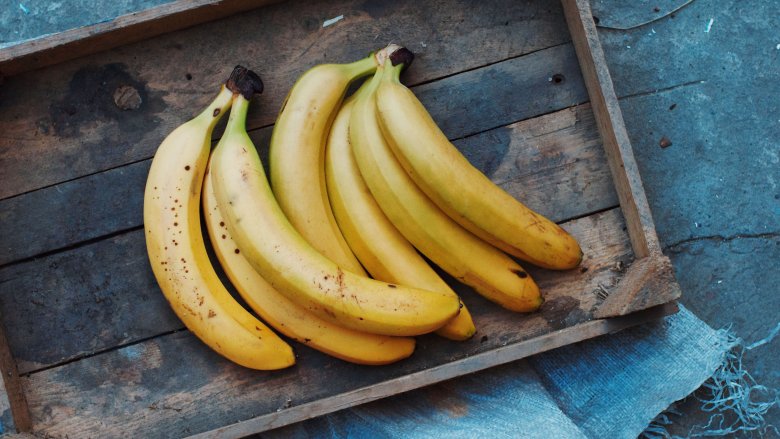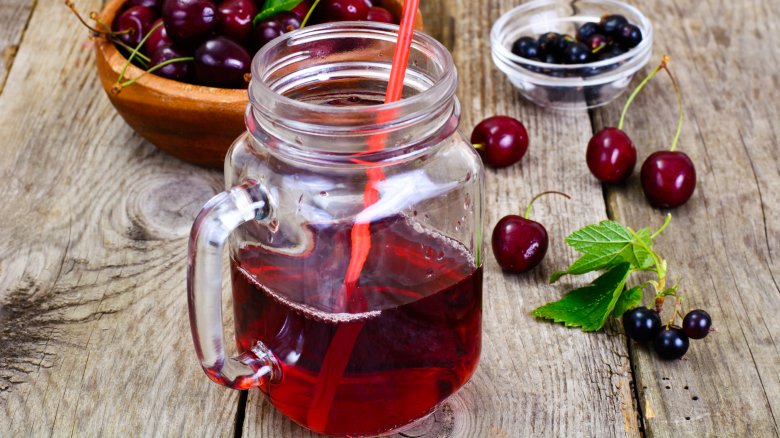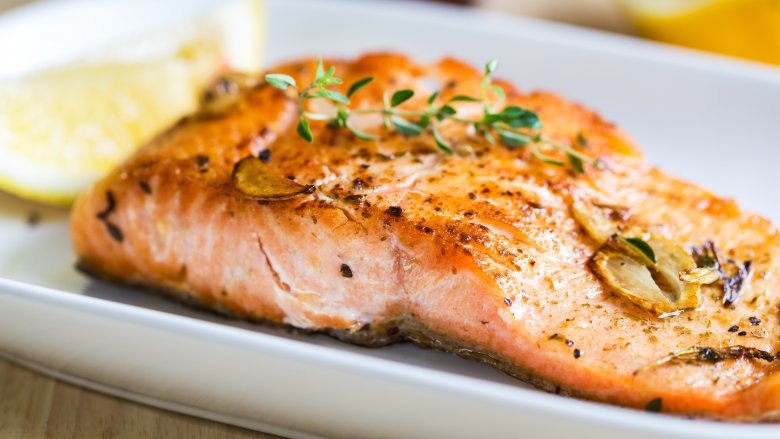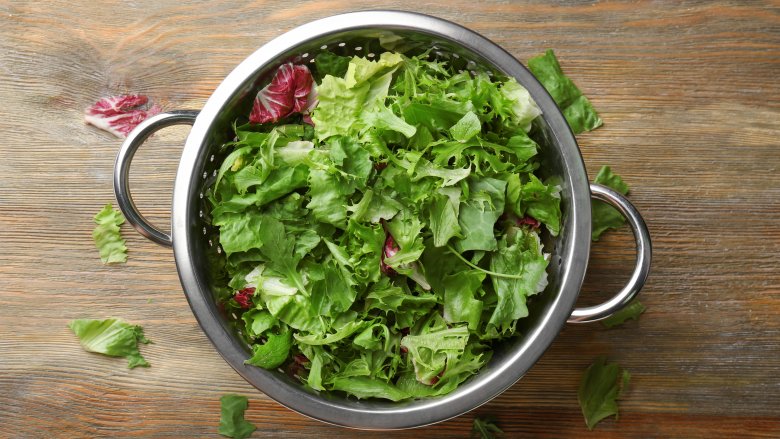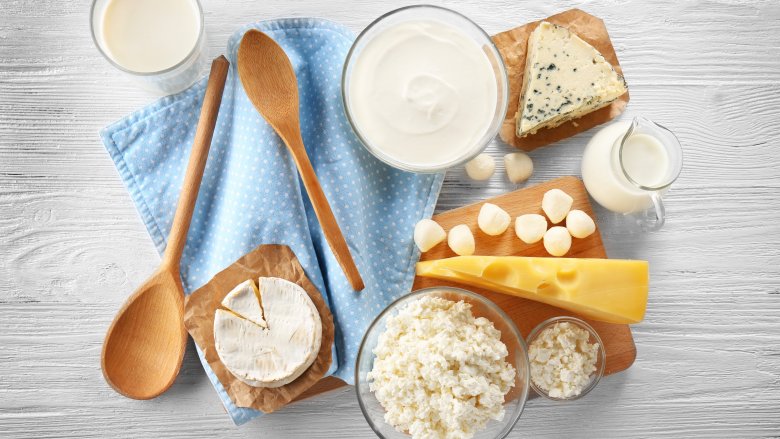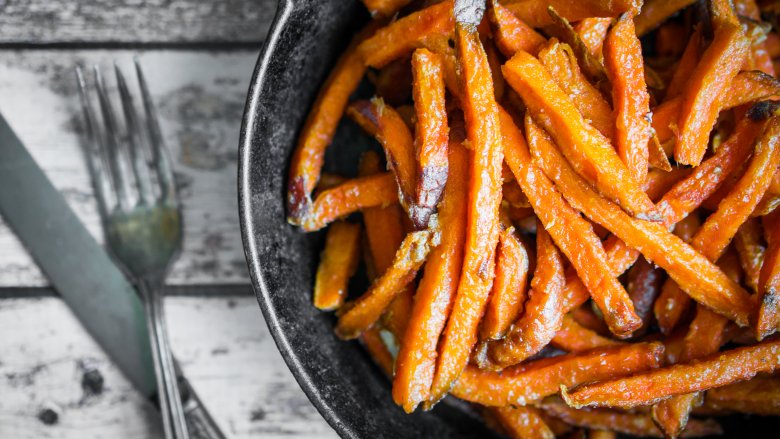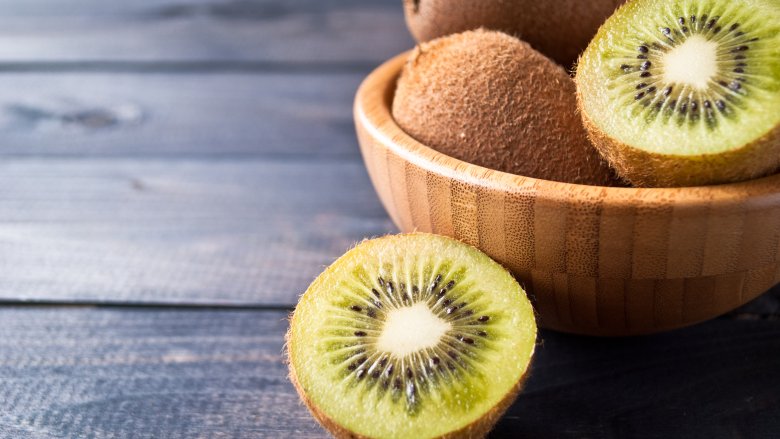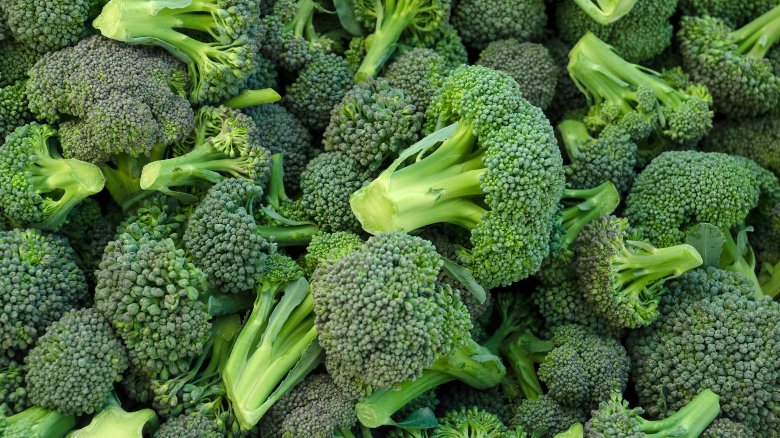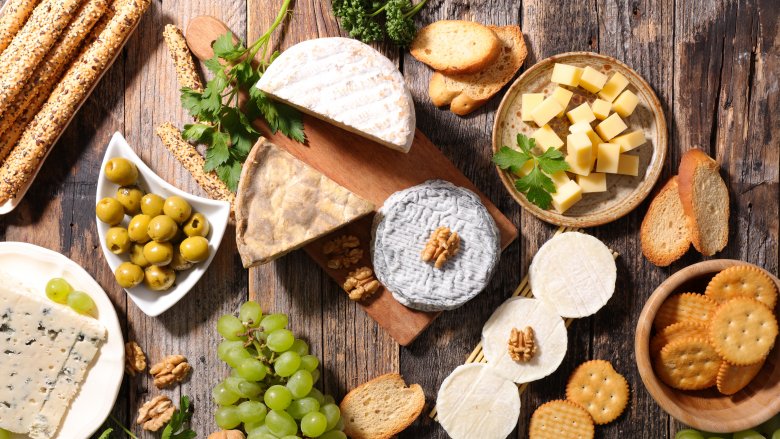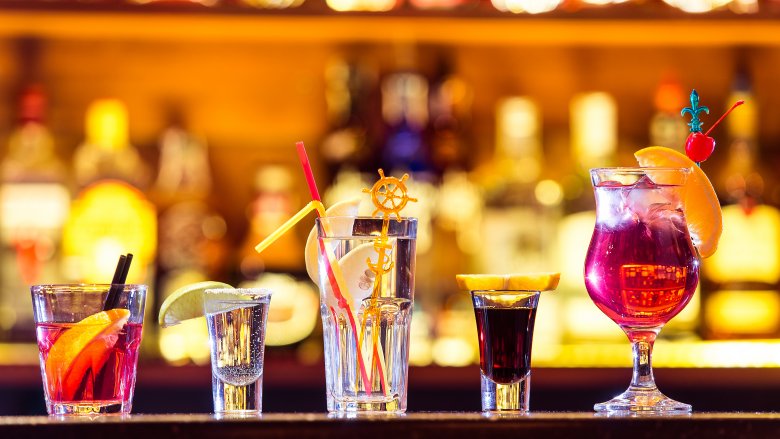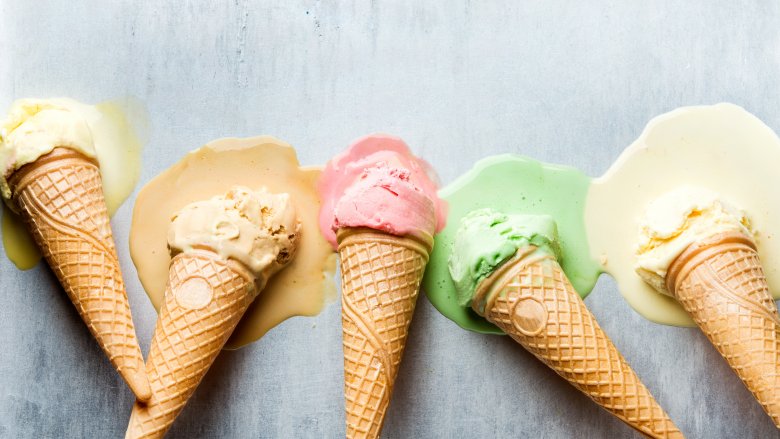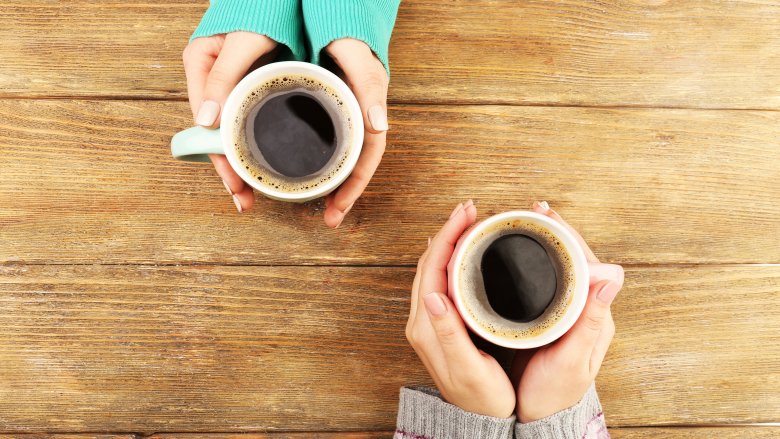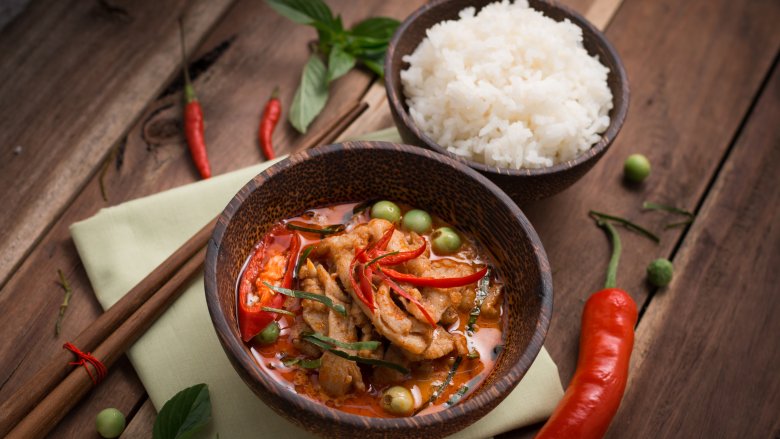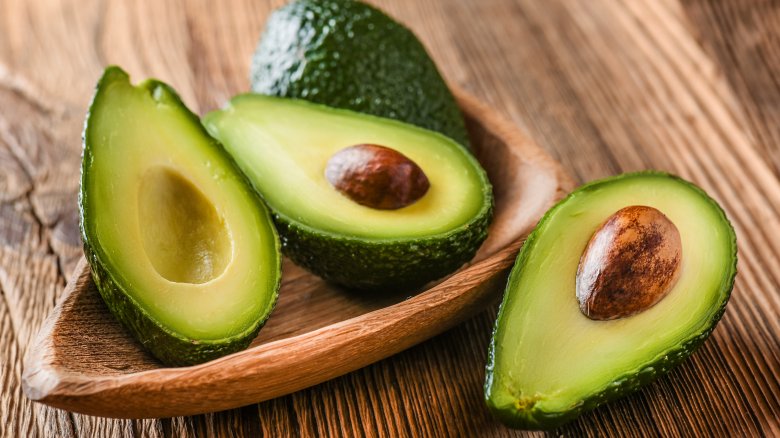7 Foods You Should Be Eating Before Bed And 7 You Shouldn't
Though you've likely heard it's better if you don't, everyone needs to eat a little snack before bed from time to time. It can be difficult, however, to know what the best choice is when it comes to bedtime snacks. Obviously, if it's getting close to bedtime, you don't want to compromise your quality of sleep, and there are so many things that, if you eat them too close to bedtime, can really hold you back from getting a good night's sleep. To avoid that, make sure you're choosing the right foods for your late night snacking. When it comes to the do's and don't's of pre-sleep eating, here's what else you need to know.
Should eat: Bananas
If you simply cannot fall asleep without a bedtime snack, reaching for a banana is a good bet. Bananas contain both tryptophan — which you know from your Thanksgiving Day turkey can help promote sleep — and potassium, which is perhaps a lesser-known sleep supporter. Bonus: bananas are sweet, so you might just be able to forgo dessert and convince yourself that banana you're eating is pulling double duty.
Should drink: Cherry juice
Cherry juice is good for you in so many ways, but did you know it can promote a better night's sleep? Tart cherry juice can help boost your melatonin, which is a naturally-occurring hormone that's job it is to make you feel sleepy. Step away from the supplement aisle (where you can also find melatonin) and pick up a bottle of cherry juice instead.
Should eat: Salmon or tuna
So they may not be what you find yourself reaching for to fill up your tummy right before you go to bed, but eating salmon or tuna for a late dinner can lead to better sleep. According to Refinery29, these healthy fish contain tryptophan (like turkey), but they're also high in vitamin B6, which is essential for the production of melatonin, which is very important when it comes to getting drowsy and sleeping well through the night.
Should eat: Leafy greens
Perhaps the best way to set yourself up for sleeping success with your last meal of the day is by throwing that salmon or tuna onto a bed of leafy greens and making it a salad. Those powerhouse leafy greens like spinach, kale, collard greens, chard, and the like, are a good source of calcium, which your body needs to produce melatonin, which will help you sleep.
Should eat: Low-fat dairy
In an interview with Greatist
, registered dietitian Jessica Redmond said low-fat dairy products, especially when mixed into a snack with whole grains, such as a bowl of whole grain cereal and milk, can help promote sleep. Foods like certain cheeses, milk, and yogurt can all be a great choice when it comes to picking a snack that not only won't keep you up all night, but will actually encourage you to rest well.
Should eat: Sweet potatoes
Need a way to round out your salmon salad and create a fully sleep-promoting meal? Add a side of sweet potatoes. According to Health, sweet potatoes not only contain complex carbohydrates, which will help you sleep better, they also add a dose of potassium, which can help relax your muscles, leading to better quality sleep all night long. They're versatile, as well. Roast them, bake them, make them sweet or savory, the possibilities are basically endless.
Should eat: Kiwi
Slice up some kiwi because, according to a recently-published study, kiwi is another fruit that helps you rest easy at night. Researchers out of Norway found that eating kiwi about an hour before hitting the hay led to better sleep than opting for another fruit variety for your bedtime snack.
In an interview with Men's Health, Erin Morse, a registered dietitian and the chief clinical dietitian at UCLA Health, said that this was likely do to with kiwi's antioxidant makeup, which includes serotonin, which is known to help you fall asleep faster and sleep better.
Shouldn't eat: Broccoli
Brassicas like broccoli, cauliflower, cabbage, and Brussels sprouts might be a healthy, high-fiber food, but they're probably not be the best thing to load up on before you head to bed. In an interview with Delish, holistic nutritionist Elissa Goodman said these veggies can interfere with your ability to sleep soundly because you're likely still digesting them while trying to fall asleep (on account of all that yummy fiber!), which tends to be less than comfortable. Eat those good-for-you veggies earlier in the day, so your body has time to digest them before you lay down for the night.
Shouldn't eat: Cheese
In an interview with Men's Health, Dr. Joseph Murray, a gastroenterologist at the Mayo Clinic, said cheese might be the worst offender of all the high-fat foods you could eat before attempting to go to sleep. Fats, like those brassicas mentioned earlier, take a long time to digest — which is why they help you stay full during the day. But if you're still digesting that food while trying to fall asleep, that can cause problems. Instead, fatty cheeses should be eaten earlier in the day so they don't interfere with you getting all the restful sleep you need.
Shouldn't drink: Alcohol
While you might think you're getting drowsy after that glass (or two) of red wine, drinking alcohol right before bed can make your quality of sleep seriously suffer. In an interview with Self, Mark J. Muehlbach, a fellow of the American Academy of Sleep Medicine, said the kind of sleep you get after a couple of drinks is often interrupted more during the night and mostly spent in the lighter stages, which aren't as restorative. So yes, you may fall asleep faster after a glass (or three) of wine, but you're probably going to wake up tomorrow still feeling pretty tired.
Shouldn't eat: Ice cream
Eating a bowl of ice cream before bed isn't the absolute end of the world, but it won't make for the best night of sleep you've ever had. In an interview with Greatist
, registered dietitian Lisa Moskovitz said that, like with fatty cheese, ice cream can take a while to digest and your body really isn't able to rest well while you're still working on digesting.
Additionally, as registered dietitian and clinical nutrition coordinator for the department of gastroenterology at The Mount Sinai Hospital, Laura Manning told Self, sugar can cause your energy to spike, keeping you from easily falling asleep. That one-two punch of sugar and fat makes ice cream a sleep disruptor, rather than supporter.
Shouldn't eat: Caffeine
What, you're not shocked to see that you shouldn't drink a cup of coffee before trying to lull yourself to sleep? There's a lot of other places that caffeine could come from, though, including soda and chocolate — though foods like chocolate tend to carry caffeine in much smaller doses. In an article for Greatist, registered dietitian Abbey Sharp recommends keeping your daytime caffeine consumption to under 400 milligrams and no more, and to stop drinking coffee at noon. Switch to herbal tea if you have a nighttime tea habit.
Shouldn't eat: Spicy food
Spicy food is tasty and can be quite good for you, but you don't want to eat it too close to your bedtime. According to Health, it's the spices themselves that pose the problem. Spicy foods can cause indigestion, which makes sleeping at best uncomfortable and at worst, downright painful. One study even found that men who ate spicy dinners took longer to fall asleep and woke up less rested than those who ate more bland foods before bed. No need to be up all night because you had a taste for something spicy for dinner.
Shouldn't eat: Foods high in fat (even healthy fats)
As it turns out, you really should try to avoid high-fat foods of all kinds when you're trying to wind down before bed. Many of them aren't all that high in beneficial nutritional content, which can complicate things even more, but even the ones that are, like avocados and olive oil, take a long time to digest, as gastroenterologist Joseph Murray told Men's Health. Your body digests fat slowly — and keeps you awake in the process — no matter what kind of fatty food it is, so late-night guac isn't necessarily the best idea you've ever had, sleep-wise. Eat any higher fat foods earlier in the day so your body has adequate time to digest it before your head hits the pillow. Your body will thank you.
